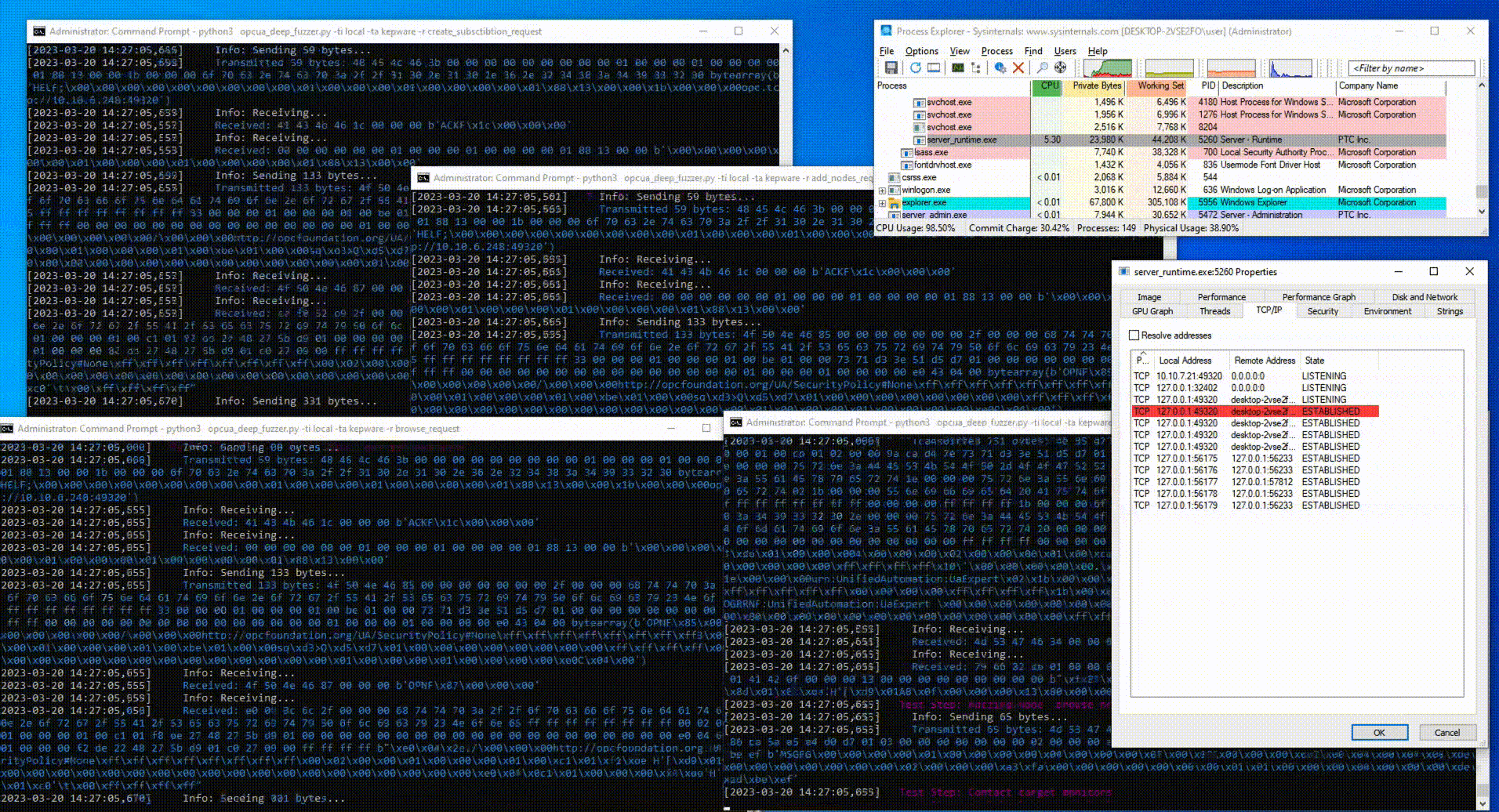We often use fuzzers in our research to find low-hanging bugs in network protocol implementations. Occasionally, we also develop custom fuzzers or harnesses to better go after specific targets.
This repository contains a network fuzzer that we developed for Pwn2Own 2022 competition to fuzz OPCUA protocol. The OPC UA (Open Platform Communications Unified Architecture) protocol is a standard means of data-exchange between industrial sensors and either on-premises servers or cloud management platforms.
The fuzzer is based on the boofuzz framework. For more info check out our Claroty Team82 blog here
Install dependencies
python3 -m pip install -r requirements.txt
Run the fuzzer
python3 opcua_fuzzer.py --target_host_ip 10.10.10.10 --target_host_port 4897 --target_app_name softing --request_opcua_to_fuzz browse_request
target_host_ipIP of the OPCUA Servertarget_host_portPORT which the OPCUA Server Listens totarget_app_nameThe type of the OPCUA Server to be fuzzed, choose fromkepware,dotnetstd,softing,prosys,unified,ignitionrequest_opcua_to_fuzzThe OPCUA Server request type to fuzz, choose fromread_request,browse_request,browse_next_request,create_subsctibtion_request,add_nodes_request,history_read_request
When the application crashes, the fuzzer will stop because no new connections could be made with the server. The last 1000 sent packets are saved in a sqlite database in the boofuzz-results directory within this repository. The status of the fuzzer can be monitored here: http://localhost:26000/
Sometimes before running the fuzzer you want to ensure that the OPC UA session is correctly created and terminated. To send only one mutation with \x00 payload above ReadRequest, change IS_TEST_RUN variable to True
- KEPServerEX (kepware)
- UA-.NETStandard (dotnetstd)
- Softing OPC Server (softing)
- Prosys OPC UA Simulation Server (prosys)
- OPC UA C++ Demo Server (unified)
- Ignition's OPC UA Server (ignition)
- Read Service (read_request): we are fuzzing the nodes to read
- Browse Service (browse_request): we are fuzzing the browsed nodes
- Browse Next Service (browse_next_request): we are fuzzing the browsed nodes
- Create Subscription Service (create_subsctibtion_request): we are fuzzing the entire content
- Add Nodes Service (add_nodes_request): we are fuzzing the content that describes the nodes to be added
- History Read Service (history_read_request): we are fuzzing the number of nodes and the entire content of the read history request
- implementation:
opcua_services.py
While the majority of OPC-UA protocol stack implementations will work out-of-the-box with the currently supported servers, users can add new support for other OPC-UA implementations. Please note that as we mainly developed this fuzzer for ourselves, the procedure of adding new support is not very developer-friendly. So what do you need to do to add new OPC-UA implementation:
raw_messages_opcua.py- Copy raw packets from Wireshark when a regular client (e.g. UaExpert) is connecting to the server. The needed OPC-UA messages are: Hello, Open Channel, Create Session, Activate Session, and Close Session.raw_messages_opcua.py- Add support for your server inget_raw_open_session_messagesandget_raw_close_session_messagesfunctions.opcua_utils.py- Add your new server type to the following functions:target_apps,get_services_list,get_sanity_payloadopcua_utils.py- Add hardcodedReadRequestmessage (copy from Wireshark) for the new server. It will be used for sanity to check the server is functioning.opcua_utils.py- Editclose_sessionfunction by adding your server totarget_app.opcua_session.py- Some servers require specific flow upon session creation. Add the changes tocreate_sessionfunction if needed.
- For each mutated packet separate OPCUA session is created (HELLO, OPEN CHANNEL, CREATE SESSION etc).
- For most of the OPCUA Servers (.NET excluded) the session is terminated after each mutation.
- To ensure fuzzer stability, validate that the target server is configured to allow many concurrently opened sessions (around ~1000)
- When fuzzing, ensure that the fuzzed service doesn't restart automatically after a crash.

